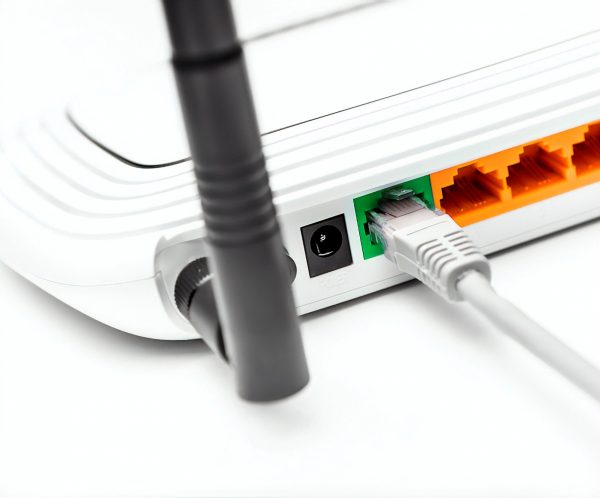Study Claims UK Consumers Want Universal Broadband Routers

A new Uswitch (Opinium) survey of 2,000 UK adults, which was conducted last October 2021, has estimated that there are now 22 million “redundant” broadband ISP routers sitting in British homes, while 76% of respondents want a “universal router” (i.e. one that can be used by any ISP) to help cut e-waste.
According to the survey, some 42% of respondents have an unused router in their home and 14.29% claim to have two or more unused routers (that’s definitely me). Meanwhile, 59% do not know how to recycle their old router and 15% were sent one by a provider, even though they already had a working device.
Younger people were also found to be the most likely to feel guilty about accumulating spare routers, with 36% of 18-34s regretting not recycling a router, compared to 16% of over 55s. Finally, some 60% of consumers feel broadband ISPs could do more to help save the planet, with Sky Broadband being voted the worst for helping users to recycle (oddly, the survey didn’t mention how other ISPs performed).
Advertisement
But would a so-called “universal router” solve all this? We have our doubts.
The Universal Router Conundrum
The reason for our scepticism is partly because technology is constantly moving forward, which means that over time we all seek faster broadband and faster WiFi, as well as security improvements and so forth. Even a universal router would need to change with the times, which in practice means new hardware being needed every few years to replace the old.
Lest we forget that most consumers don’t switch ISP very often (switching and upgrades often come attached to a new router), thus the amount of router linked e-waste might only be reduced by a small amount from the adoption of a universal approach. Likewise, a router that has been designed for a slow low-cost ADSL service may not be much use on a gigabit FTTP line, so the idea of a truly universal approach has some limitations.
Speaking of technical limitations, some networks required specific standards and technologies, which may not be supported by the routers used on other networks. For example, Openreach were quite strict with only using approved routers on their VDSL2 (FTTC) lines, since some other models could cause connectivity problems if they didn’t support key features. This is not an issue for a knowledgeable IT user, but for casual use it could create problems for support.
Advertisement
On the subject of support, it’s a lot easier for an ISP to support and provide software updates (security and features) for a device that they themselves have supplied to a consumer (impossible to train staff for all the other variations), and some providers even like to customise the firmware in order to support new rules and regulations (e.g. Ofcom’s requirements for speed testing). But that won’t work across all providers, which may have very different networks and variables to consider.
Closing Thoughts
The survey itself focused on asking respondents about “unused” routers, but that is not necessarily the same thing as a “redundant” device. The survey fails to understand that distinction. Lest we forget, it’s handy to have a spare router for testing, or in case your main one fails, thus what is “unused” today could be “used” tomorrow. But some of us will certainly have redundant devices too, much like the pile of Smartphones and IT kit under my desk (honestly – it’s a historical museum of technology under there).
In short, we fully support the idea of ensuring that all routers are shipped unlocked for use on other networks, or that ISPs don’t prevent customers from being able to use a third-party device if they so wish. But, as highlighted above, there are some technical caveats that mean they may not all work properly on every broadband network you attempt to use them on.
However, the core idea of encouraging ISPs to make it easier for customers to recycle their unused routers, and to offer a service that enables new or departing customers to return old routers, is a good one. Some ISPs, such as BT, do an excellent job of this, but others find it easier just to let consumers keep the old hardware.
Advertisement
Failing that, there’s always eBay, assuming the router isn’t locked down. We should add that a lot of ISPs out there, particularly smaller providers, do not place restrictions on your choice of router, but many of them don’t make this clear to new customers. In fact, ISPs in general are not very good at highlighting the full capabilities or restrictions of their routers to new customers, which is another area that could be improved.
Mark is a professional technology writer, IT consultant and computer engineer from Dorset (England), he also founded ISPreview in 1999 and enjoys analysing the latest telecoms and broadband developments. Find me on X (Twitter), Mastodon, Facebook, BlueSky, Threads.net and Linkedin.
« Internet Censorship Beckons as UK Online Safety Bill Hits Parliament






















































People go out of their way to get a router that can have Openwrt flashed onto it. The Home Hub 5 get people buying them used on eBay over many other newer versions as its the only one that offers this. If every ISP offered OpenWRT routers and then just trained their agents how to use this operating system. Everyone would be happy. I have personally searched for cheap used ISP routers that can have OpenWRT flashed onto it to no avail. OpenWRT takes a router from 15 years ago and makes it current and very usable.
Problem is that most people are too stupid to use OpenWRT, 59% don’t even know how to recycle…
Lol I like it Mike
Except OpenWRT in many cases can’t take advantage of the proprietary hardware acceleration functions built into the router, meaning that often when you flash OpenWRT you often actually make the device worse for performance in a lot of cases.
You probably wouldn’t notice this with FTTC speeds, but with FTTP you really need these functions working to achieve full speed on a low cost device at gigabit and beyond.
ISPs presumably want to provide routers that work out of the box and with remote testing and diagnostic software on them and ideally no unnecessary user configurable options available that are likely to trigger a call to their support either for instruction on how to use them, or because the user messes a settings up and causes themselves a problem, probably followed up by a complaint from their customer if the ISP resets their custom settings to get their connection working again for them.
I’ve been using a BT HH5a I flashed Openwrt on for several years, however as with most routers Openwrt supports, due to the lack of opensource documentation and code for proprietary hardware, it lacks hardware acceleration.
It’s what 9 year old router, but for faster connections you need the current development branch as it has a much improved network driver, and for many VDSL connections you will also need to build it with an added patch to provide full vectoring support which has only just been released…
I think what ISPs should do is when you sign up to a broadband contract they should ask if you would prefer your own bought router. Because the ISP suppled is rubbish and they lack security.
But literally the only reason the ISP routers are rubbish and lack security is because of the OS they use on them is terrible. If any of those routers could have openwrt installed onto them they’d be worth their weight in gold (well maybe not that much, but very useful).
But even brought routers have there own issues, specially when people are buying cheap devices with all sorts of security woes.
The reality at the moment is cost is everything and not just for the ISP but the customers too.
Our community strives for good, reliable and secure, the other 99% lack knowledge to know any better and want everything for nothing.
I bought router even security flaws I know any router bought or free will have security problems. But bought routers have better features and better Wi-Fi. Nothing is perfect.
Yes generations evolve. However to me things like pppoe/authentication etc should be a set standard so that any router works for that service. I have Sky FTTP so have their sky hub. I have both a normal router that would do the same job, plus a top spec Talk talk one. Why should I not be able to login to the talktalk router and change username and password? Sky use an obscure authentication protocol and hid username and password. I know support would be more difficult. Again set a shared standard for ISP remote access.
Sky actually made a change and as long as your router supports DHCPv6 Prefix Delegation (PD) then no need for username or password and it will automatically connect.
https://helpforum.sky.com/t5/Broadband/Third-party-router-with-FTTP/m-p/3550951#M219779
There is a more complex compromise pissible..going back to a two box solution, where the ISP supplies a DSL/FTTP/4g/5g modem (mandatory, their choice but keep it fairly open for config) and an optional router with WiFi that just has a 10gbs upstream connection. The modem could also have sip capability to support analogue switch off, with bandwidth capping if customer doesn’t want broadband service
Ideally the modem would have a special plug on the power supply to allow the modem and router to share one power socket
But there would be no need for two routers if they kept the operating system the same. In phones now days we have standardized OS (Android). Why not them have similar for routers? There is absolutely no need for every brand of router to need its own unique config page when they all do the same thing.
This is what annoyed me with BT, before I left them, I HAD to use their router because of the switch the mid-contract switch over to VOIP/’Bt Digital’.
I wish they had just kept that functionality in the ONT, which long term might be better.
@Anthony Goodman
Even if they took an Android approach, chances are it wouldn’t solve your issue as many ISPs would likely still customise it in some way, both on a hardware and software level, similar to Android handset manufacturers.
An example I can think of is Asus using Tomato as the basis of AsusWRT.
Personally, I prefer having either two separate devices or the ISP router having a ‘modem mode’ so that I can use my own equipment, which in my case is a VM running PfSense.
Reality…. Nothings gonna change, ISP’s will just be made to enforce a recycling policy, including requiring customers to return equipment and maybe incentivise recycling old kit too.
ISP’s will not open up line terminating kit, it unbalances the competition in the market (IE. Who’s paid for whose kit)
It’s also not ideal in cases where systems could be abused and tampered with, specially always on networka like FTTP and Cable where MAC addresses and serials could be spoofed and networks compromised.
Openreach just installed my FTTP and I told BT I didn’t want or need their equipment. They told me if I sent it back that my service would be stopped. I’m forced to store the equipment for the duration of the service, by which time no doubt they’ll be using newer equipment so this new router will go straight to recycling.
Keep that router accessible, if you ever have any issues with your service you’ll need to use it for them to perform diagnostics.
Same for me with Community Fibre FTTP, apart from the diagnostics as their OTN is the only thing needed for them to check for errors, but their standard router is better than the majority as it’s a Linksys vellop mesh
Recycling policies probably won’t help as the components/materials cannot realistically be reclaimed.
What the industry needs is some common sense.
There are tons of VDSL Routers out there without a WAN port so as people change to FTTP they get a new Router by default. In most cases all it needs is a change of firmware, instructions on what port to use as the WAN and perhaps a little red label to help. Only if someone is seeking a higher product or additional services should a new router be required by default.
In addition surely for those that wish to use there own equipment (USHomeHubs/Mesh/AP) they only need a tiny router the size of a Edgerouter X next to the ONT providing ISP specific login etc in a bridge mode which will could be universal that would survive the constant ISP switch every 18 months driven by introductory offers.
Whilst this is a good idea (in theory), in real life it will never happen.
Think about it – all routers would be identical. Why would manufactures bother to produce a range of routers ..?
Everybodies kit would become the same – so much for choice …
Wait till people start having multiple ONTs to deal with from the various Fibre providers overbuilding!
Ofcom should insist a consumer can use their own router. I never use the ISP provided as they are rubbish I prefer to buy my own higher spec routers and mesh systems.
As others suggest maybe the average joe models should be based on open standards so they can easily be supported and used on different ISP’s.
I think we will get there by eliminating routers.
There is nothing to stop an ISP delivering plain IP over ethernet at the ONT, with the DHCP server, NAT, firewalling and routing at their end. The customer equipment could simply be a standard access point, or a switch and an access point for those who need wired connectivity also.
Obviously that wouldn’t suit some of the more “power user” types but it would be perfect for the majority of households. Some of the “power user” functionality (e.g. fixed NAT mappings, fixed DHCP leases, firewall holes, etc.) could be a web driven configuration controlling the ISPs equipment if required.
To be perfectly honest we need to bring back the separate modem, and along with that make it available as an option just to get a modem from the ISP, as personally I use a mesh solution and on my old VDSL isp their combined hub blocked its usage over Ethernet. Where as offering a standard option for modem only service where the ISP provides the modem that gets returned to the ISP.
Have to agree on that one. Give users the choice of the normal routers / wifi hubs you get now plus the option of just a modem. Virgin used to do it right with the old Ambit before the super hubs came out.
I’m not sure you could legislate for a universal router, but you could definitely make ISP routers something that the subscriber can opt-out of receiving, enforce a bridge mode in cases where the router is also the ONT, VSDL or cable modem, and force ISPs to accommodate third-party routers by publishing the details needed to connect.
This is relatively easy. Require that customer premises equipment supplied must provide one or two outputs for the WAN side: rj45 or some popular fibre medium.
ISPs can combine routing and wifi into this single box, but it must also support bridge/modem mode.
Adopt an authentication standard (much like how wifi has standardised WPA2, WPA3. Today, PPPoE is common, assuming it offers adequate security, it can be adopted.
Provide DHCP or allow static IP assignment to whatever is connected to the WAN side
To a large extent, Virgin Media already ticks this box.
Many ISPs market their service based on the wifi performance of their supplied router, so I can’t see a universal router being popular with ISPs.
I’ve read that Sky/Now will work with Talktalk routers on some VDSL connections, with some new sky customers not noticing when they’ve switched because their talktalk router still connects.
Apparently both ISPs support IPoE with DHCP, and Sky’s network just requires either DHCPv6 with PD on an IPv6 connection (although that doesn’t work on some older cabinets), or IPv4 DHCP plus option 61 with anything in it, so no user or ISP specific authentication details to connect. The dslam takes care of authenticating the user.
So, it would seem Ofcom could mandate a standard connection protocol and I can’t see why ISPs could not agree on a standard set of diagnostic tests to be supported by all ISP provided routers so they could be used interchangeably…
Although perhaps it would be more useful if third party manufacturers started adding optional support for a simple ISP mode with the same set of tests and standards, so that a user with a third party router could temporarily put it in its basic “ISP mode” when they have an issue, so wouldn’t require an ISP supplied router when they were seeking support for a suspected line fault. Although I expect the ISP would often still want to send them their own replacement router just in case.
Yeah the problem comes when Ethel and Fred call up their ISPs Indian call centre.
Do you expect that the support people will be trained on every possible universal router?
Nope. You’ll get told to plug in the ISP modem instead to diagnose. And I think that’s fair enough. I wouldn’t want to do tech support for routers i’ve never used.
A true universal router would have a basic standardised universal interface to make it easy to support, ideally with all ISPs using DHCP rather than PPPoE, so no messing with protocols and authentication details.
It could also still have a secondary prettier, more advanced interface which additional settings which the ISP wouldn’t offer any support for and could be overridden and disabled by a single setting in the isp supported basic interface.
Although, I’m not suggesting adopting universal routers would be worthwhile and some of the ISP routers I’ve been sent were pretty useless anyway, eg ones with just two ports.
@Mel PPPoE makes wholesale supply, passing authentication to the retailer, much easier than DHCP does. Yeah, using PPPoE over FTTP does seem weird, but that’s at least part of the reason.
That is why getting rid of the router is the answer. The ISP can provide support more effectively if they have full visibility of the customer’s network without a router in the way. The only customer equipment would be a WiFi access point (which the ISP could still supply if they wanted) or a simple ethernet switch (which in general requires no configuration).
So if you aren’t offering a router or access point what’s delivering IP addresses and handling NAT? Is there a centralised DHCP server and NAT gateway shared, maybe MAT-T, CGNAT, both of which envisage a gateway at the end user site but it could be further down?
You could make that work but it’d be a nightmare.
With no router at the customer end, the ISP is running a DHCP server and providing the NAT (for IPv4 at least). It is not clear to me why that would be a nightmare – is it really easier to have thousands of little processors all running different bits of (rarely updated) software spread around the country or a small number of big boxes running well maintained software doing it in a data centre?
If I was in charge of maintaining it then I know which I would prefer. It isn’t very technically difficult although it might suffer from not having been done at scale before.
If you want the buzzword version then think of it as moving functionality from the customers’ equipment to the cloud.
If the ISP had enough IPv4 addresses, it could even get away without any NAT at all – depends on their stock of IPv4 addresses vs. the average number of connected devices owned by their customers. (I think this approach would be unlikely, but some ISPs might have IPv4 stocks that make this viable).
Assuming the use of NAT, it also significantly reduces the depth of penetration of IPv4 DoS attacks into an ISPs network as many of them would never reach the link to the end customer.
Sorry, bad form to follow my own post, but my vision is that this wouldn’t be CGNAT (which I assume is defined as more than one customer behind a single IP address), although it could be. My vision would be to retain a mapping between an IPv4 address and a customer, just move the NAT process to the ISP end of the link.
Pointless have any supplied isp router. As none of them support Wi-Fi 6E. Hence more pointless wastage with recycling when people upgrade again.
I find that strange that sky are the worst at helping their customers recycle. They almost demand their routers back or you pay. Surely that is recycling
I think that is just people failing to understand why Sky want to router back.
Sky recycle the parts internally and put towards new Sky routers.
And since 2020 BT has done exactly the same… :- https://www.bbc.co.uk/news/technology-51294395
Before that the router was yours when you joined BT, although they still repeatedly “requested” you to send it back.
All the more reason to want the option to not be automatically sent an ISP router if you intend to use your own.
I am using a 9-year-old T.P-Link cable router, connected to an Open reach FTTC modem, the Zyxel router plusnet sent to me a couple of years ago, decided to giving, up keep disconnecting from Wi-fi.
I agree this sending out routers to people even when they don’t need it is wasteful, but also people are to blame as well, with wanting new routers when they come out, just like mobile phones really.
I changed ISP, tried sending my old router beck to Zen, they didn’t want it, told me to recycle. I’ve got half a dozen routers sitting in boxes in my loft: Plusnet, Zen, post office, nowtv, more I can’t remember.
I don’t use the ISP’s supplied router anyway, I use a Linux router (based on a Gigabyte ga-j3455d3v motherboard), and Ubiquiti UAC pro WiFi AP.
But, I still need to “buy” the ISP’s router because if there’s a problem, you need to plug their router in and test the circuit with that, they can’t do diagnostics with just any type of router.
I haven’t used an ISP Provided Router since the days of the BeBox. As soon as I got FTTC (2 box solution) I moved over, first to consumer routers, then consumer routers I could flash OpenWRT on, and finally now to a Ubiquiti Dream Machine Pro – I ended up biting the bullet and getting 28 drops of Cat 6 added to the house, along with another 3 drops for ceiling mounted U6-Pro’s and now have a rock solid connection. Majority wired, and mobile devices wireless.
But I agree, for most people, a single router they can switch between providers without any fuss is going to be preferable to reducing e-waste, as long as they don’t stop people like me running other things.